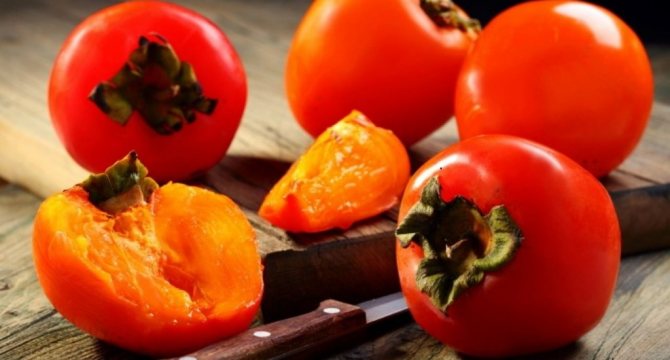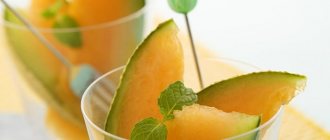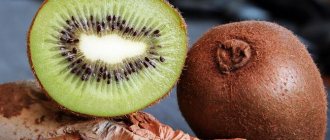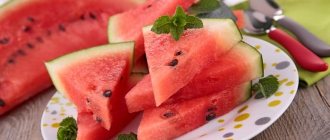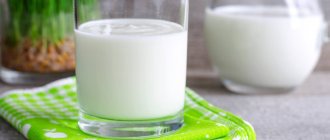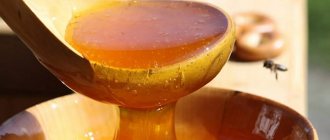The benefits of persimmon during breastfeeding
This fruit brings great benefits to a nursing mother and her baby. It promotes:
- restoration of strength;
- increasing immunity;
- stabilization of brain function;
- improving the functioning of the cardiovascular system;
- saturating the body with essential vitamins and microelements;
- normalization of the digestive system;
- calming the nervous system;
- improving the functioning of the thyroid gland;
Due to changes in hormonal levels during pregnancy and after childbirth, a nursing woman may “suffer” from depression and stress, and this berry can help get rid of them.
- removing toxins and harmful substances from the liver;
- increased lactation;
- removing excess water from the body;
- strengthening the strength of the skeleton and preventing rickets in infants.
Due to the content of vitamin PP in this product, a nursing mother can improve the condition of her hair and skin color.
Nutrient content
This product has a rich chemical composition. It boasts a huge amount of:
- vitamins (A, C, PP, B1, B2, E);
- macroelements (calcium, magnesium, sodium, potassium, phosphorus);
- microelements (iron);
- glucose and fructose;
- tannin and dietary fiber.
The fiber contained in this fruit has a laxative effect, and tannin has a strengthening effect, so how these factors will affect the baby’s body depends on the individual characteristics of the body and the ripeness of the fruit.
Considering so many beneficial properties, we can definitely say that persimmon is useful for breastfeeding.
This fruit consists of 80% water, and this has a beneficial effect on milk production.
Benefits for the intestines
Due to the fact that ripe, juicy fruits contain a lot of pectin and dietary fiber, most often there is an increase in peristalsis and the removal of food debris from the body. This factor also helps prevent the development of malignant neoplasms in the digestive system.
A special feature of this fruit is the fact that it protects the intestines from E. coli.
Beneficial properties of the fruit
Persimmon is truly considered one of the most famous healthy fruits. It is rich in many vitamins, minerals and other substances that have a beneficial effect on the child’s body. So, the benefits of using the product:
- Vitamin C improves the baby’s immunity, actively fights infections and bacteria, improves metabolism, and strengthens the walls of blood vessels.
- Thanks to beta-carotene, vision improves, so in addition to carrots, you can safely eat kinglets.
- Rutin protects the walls of blood vessels and controls the functioning of the liver.
- Magnesium, which is part of the king, helps the heart function, especially has a positive effect on the activity of overly active children, having a calming effect.
- The coordinated work of the human cardiovascular, nervous and skeletal systems is impossible without calcium and potassium, and this fruit has plenty of them.
- Iron is involved in the production of hemoglobin.
- Fiber improves the functioning of the gastrointestinal tract.
There is also a lot of manganese and iodine in the pulp of the fruit. The beneficial properties of such delicacy prevent constipation, diarrhea and gas formation.
Expected side effects or harm of persimmon during breastfeeding
Despite the fact that this product has a lot of useful properties, it can have a harmful effect on both mother and child.
Danger for baby

This product may have an adverse effect on the child’s body, namely cause:
- allergic reaction (in the form of rashes, rhinitis, etc.);
- constipation, colic, increase gas formation;
- obstruction of the intestines and stomach.
If, when introducing this product into your diet, your baby experiences any changes in well-being, immediately inform your doctor!
Danger for mom
This fruit can also have a bad effect on the condition of a nursing woman. She may experience the following changes:
- allergic reaction;
- constipation;
- increased blood sugar;
Due to the large amount of sugar contained in this fruit, its consumption is prohibited for people with diabetes.
- increased frequency of urination, which is not desirable during exacerbation of diseases of the urinary system.
Correctly introduce all foods into your diet and then minimize the risk of adverse reactions.
How to properly consume persimmon while breastfeeding?
The introduction of this product into the diet of a nursing mother should be carried out after the consent of the pediatrician.
This fruit should be introduced into the menu gradually in the morning, starting with a small piece, and at the same time carefully monitoring the baby’s reaction. In the absence of an allergic reaction, you can gradually increase its amount.
Before trying to introduce persimmons, it is recommended to have a small snack. Like all fruits, before eating, you need to wash it well under water.
The integrity of the product must not be compromised, as it may harbor bacteria, and it must be mature.

When can you start eating persimmons after giving birth?
Persimmons can be consumed during breastfeeding from three to four months of age. But it is best to introduce it into the mother’s diet, if there is a risk of adverse reactions, from six months, when the functioning of the baby’s digestive system is more perfect.
How much and in what form?
You need to start introducing this fruit with one tablespoon, then its volume can be increased to one piece.
The use of this product during breastfeeding should be limited to 200 - 300 grams per day. No special preparation is required before eating persimmons. The fruits are consumed fresh. It is forbidden to drink it with cold milk or water. You can also eat this fruit in various dishes (jam, baked goods, etc.)
If mother eats this product in dried form, then the portion should be reduced by five times.
To neutralize the effect of tannin, this fruit must be placed in the freezer several hours before eating.
Rules of use
Considering the characteristics of the fruit, you need to use it correctly. This is the only way to get all the benefits and avoid harmful influences.
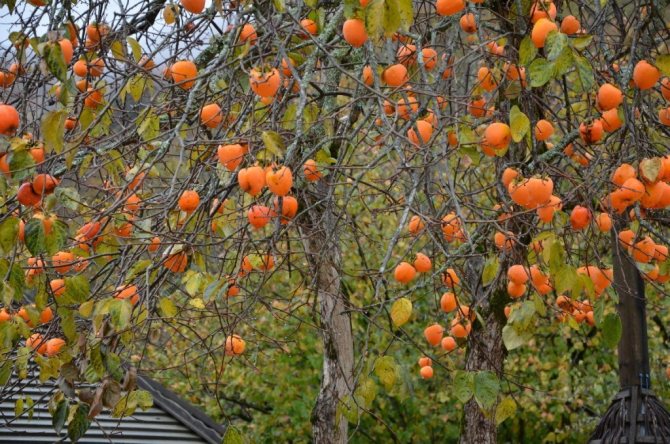
Is it possible to eat persimmons at 2 months during breastfeeding?
Is it possible to eat persimmons while breastfeeding during this period? Probably not worth it. Eating the fruit is even strictly contraindicated. Haste will be unwise, and the consequences will be very unfavorable.
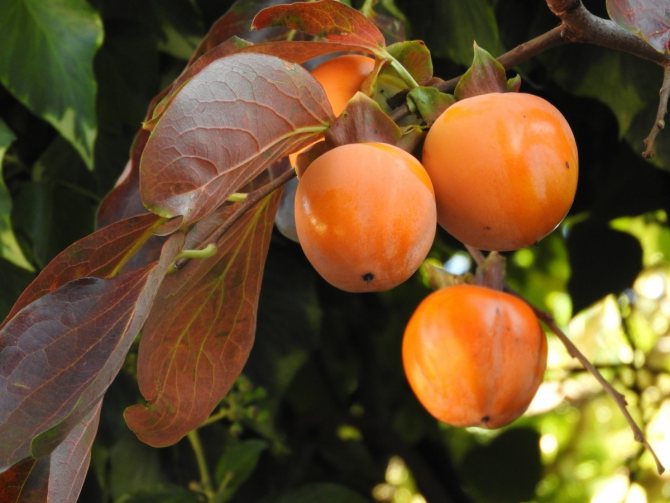
Is it possible to eat persimmons while breastfeeding at 4 months?
Is it possible to eat persimmons during breastfeeding at 4 months? You can make the first “tests”. The baby’s intestines have become stronger, so this period is suitable for introducing the treat, but still requires a careful approach and the absence of contraindications.
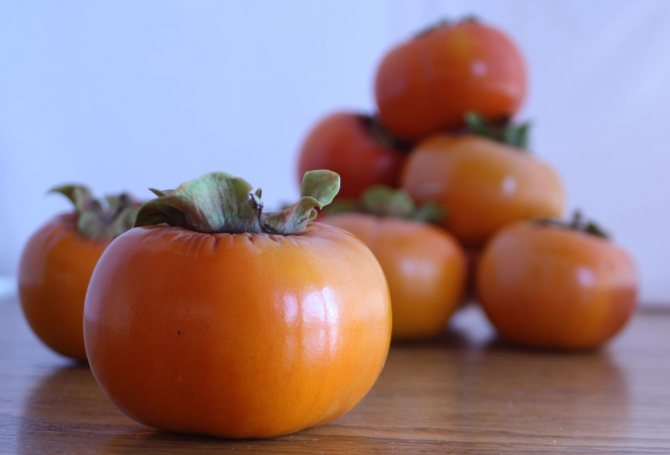
Eating persimmons in subsequent months
When mothers start complementary feeding, they can introduce fruit into their diet. The baby tries new food, a nursing woman can also pamper herself.
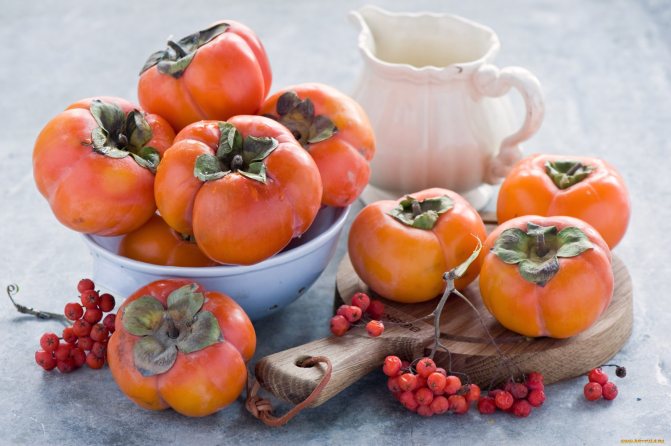
How to properly introduce persimmon into your diet
The optimal time to get acquainted with the product is morning. Important! Consuming on an empty stomach may cause diarrhea. After eating a small piece of fruit during the day (about 20 g), assess the child’s condition after feeding. If there are no negative effects, gradually increase the portion. It is worth holding off on introducing the product if any negative reaction is noticed. This could be a rash, colic, any manifestations of allergies and dyspepsia.
You should not eat fruits more than twice a week. The quantity also needs to be limited. It is optimal to eat 1-2 small fruits.
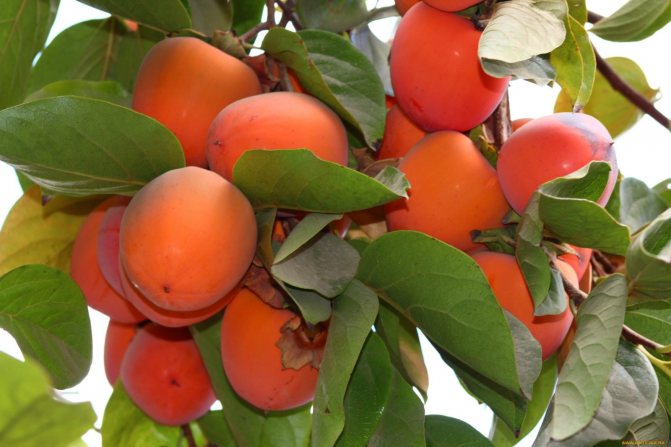
How to choose the right persimmon for a nursing mother?
The fruit should be bright orange or orange-brown in color, and should be soft, whole, ripe and sweet.
What varieties of persimmon are allowed during breastfeeding?
Not all varieties of this fruit are allowed during lactation. Only two types of them are considered permitted:
- "Korolek" has a second name - chocolate variety. It is the sweetest and safest for breastfeeding. The fruit has a slightly brownish color. The tannin content in it is minimal, but the vitamin content is maximum;
- "Sharon", this variety is crossed with an apple and is rare in sale. It is absolutely harmless during this period.
The following varieties are considered prohibited:
- “Tangerine” , since it has a high tannin content, which can disrupt the digestive process;
- “Bull's heart”, as it contains an excess amount of sugar, which can contribute to an allergic reaction and weight gain.
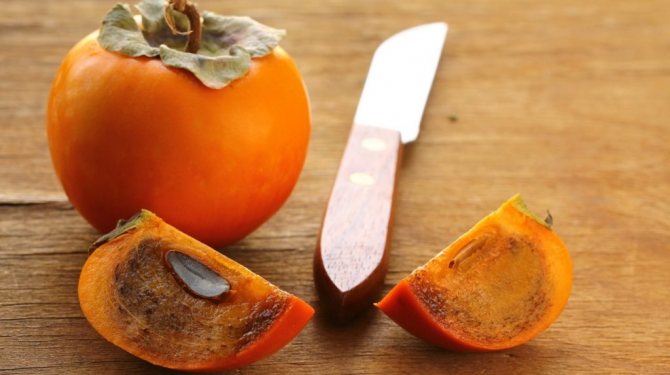
Where to buy
You can buy this product both at the market and in the supermarket, but special attention when choosing a product should be focused on its quality.
If you doubt the quality of the product, do not buy it!
How to store
The storage conditions for this fruit are as follows:
- The air humidity should be 80–95%, and the storage temperature should be 0–1 °C (therefore, it is better to put persimmons in the refrigerator after purchasing);
- You need to wash the fruit before eating. This should not be done in advance, as it will begin to deteriorate faster;
- it is advisable that it does not come into contact with other fruits and vegetables;
- in open form or paper bags;
- Persimmons should be placed on the stalk;
- in the shade so that the fruits are not exposed to direct sunlight.
A widespread way to store this fruit is to freeze or dry it, since the taste of this product practically does not change, but its beneficial properties are preserved.
This product can be stored in the refrigerator or cellar for one month, in the freezer for one year, and in the form of dried fruit for several years.
How to choose a variety
What you should pay attention to when choosing a treat:
- Manufacturer. Imported products are not always of good quality; it is better to give preference to domestic producers.
- Amount of sugar. Fruits of different varieties have the same composition, but different ratios of substances.
- Viscosity. The weaker the astringent taste, the less tannins the fruit contains. The consistency suitable for a nursing mother should be creamy, without pronounced fibrousness.
In terms of taste and nutrients, imported fruit is significantly inferior to domestic fruit. Fruits grown in the Crimea and Krasnodar Territory are more suitable for a nursing mother. Persimmons brought from Azerbaijan have proven themselves well.
What varieties of persimmons are possible during lactation?
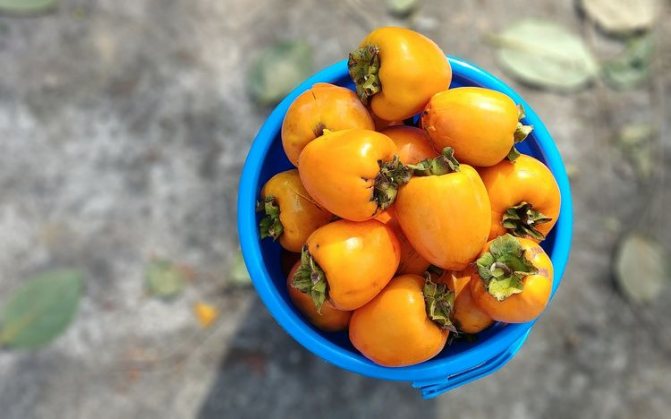
There are varieties that a nursing mother can treat without fear.
The wren is the fruit of the male seeds of flowers. It has a rich brown color and a mushy consistency. Instead of tannin, it is dominated by pectin, which stimulates the gastrointestinal tract.
The Chinese variety has a low glucose content and, accordingly, fewer calories. The fruit is not very sweet, but not astringent.
Ox heart is a large sweet fruit with bright orange flesh. It has no seeds and does not knit, as it contains no tannins. The taste is delicate and juicy.
Sharon is a hybrid of persimmon and apple. It is distinguished by the complete absence of tannins and has a sweet taste even in unripe fruits.
10 most delicious persimmon varieties

There are many varieties of persimmon, but not all of them are easily transported and reach store shelves. Let's look at the most delicious and popular types:
- The kinglet is a large fruit with brown flesh without viscosity.
- Chocolate - similar to the previous variety. It has creamy chocolate-colored pulp and thin skin, sweet and juicy even when unripe.
- Honey is a persimmon of a light orange hue, early ripening. The consistency is reminiscent of porridge - mush, and has a sweet taste.
- Tangerine looks like the citrus of the same name. A small, sugary-sweet fruit with a high tannin content.
- Sharon is a berry bred by crossing with an apple. The safest and healthiest variety for nursing mothers.
- Chinese or oriental is a low-calorie product, as it contains virtually no glucose.
- Ox heart is a large, tender variety with a creamy texture.
- Chamomile is the first to appear on store shelves. The Azerbaijani variety has a honey taste; the fruits brought from abroad are fresher and astringent.
- Fig is a flattened fruit, not recommended for lactation due to the large amount of tannins in the composition.
- Egyptian has a peculiar elongated shape. This is a very beautiful, but not very tasty fruit.
Is persimmon really necessary when breastfeeding?
This product has a lot of useful properties and, in the absence of contraindications, is allowed and useful during breastfeeding.
Still exotic or already “our own”?
Due to its inexpensive cost and pleasant taste, almost every family can afford to buy it. And in warmer regions, some families grow this fruit in their gardens. Therefore, it is not as exotic for our body as many others.
When is it better to give up?
If the mother or baby has contraindications to consuming this fruit or has side effects on it, then it is better to refuse it.
